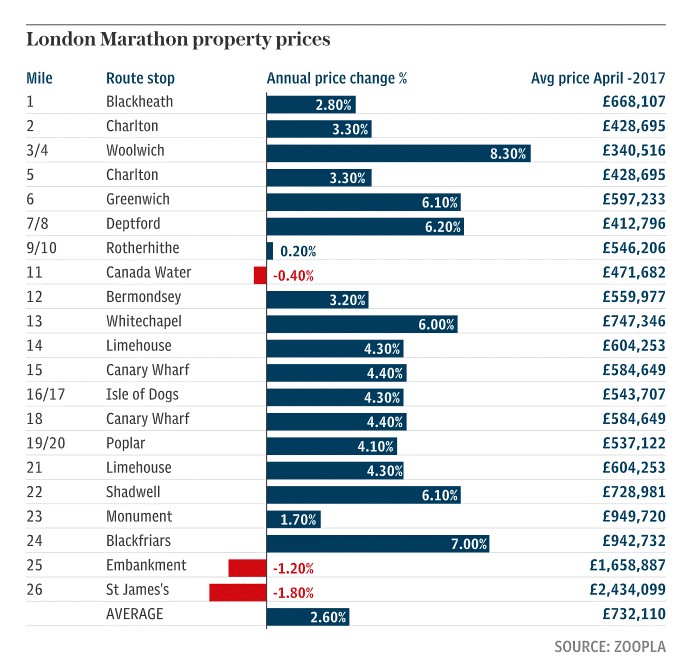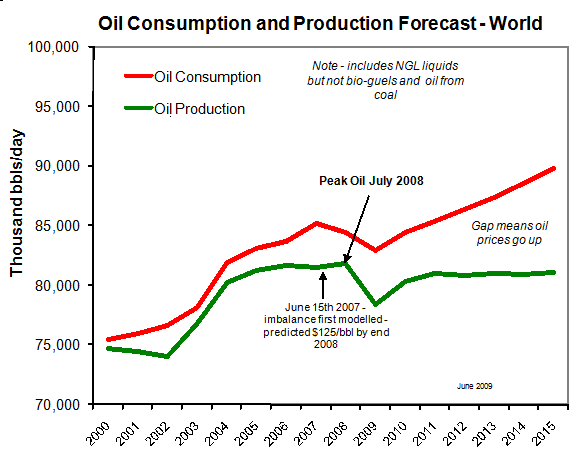314: Global oil shortage potential crisis just around the corner
04-11-2010
PropertyInvesting.net team www.google.co.uk
 Peak Oil - Plateau: We have been warning about Peak Oil for many years now - a key topic for our website visitors since 2005. As we have described before, we are now on a bumpy plateau of peak oil production thats about 75 mln barrels a day of conventional crude oil plus 11 mln barrels a day of
Peak Oil - Plateau: We have been warning about Peak Oil for many years now - a key topic for our website visitors since 2005. As we have described before, we are now on a bumpy plateau of peak oil production thats about 75 mln barrels a day of conventional crude oil plus 11 mln barrels a day of
 Economics Makes No Difference: Economically and market minded people believe that if the oil price goes up, new supply will come on-stream to fill any supply-demand imbalance. We dont buy this argument. Reasons are:
Economics Makes No Difference: Economically and market minded people believe that if the oil price goes up, new supply will come on-stream to fill any supply-demand imbalance. We dont buy this argument. Reasons are:
1. If you look at all countries and fields that go into production decline, no matter how much money is put into trying to stem the production decline, it does not help. Governments, national oil companies and private oil companies dont continue to invest in ever increasingly expensive oil production. Instead, the oil price skyrockets, demand comes down as people use less oil, it creates a recession and meanwhile people, businesses and governments start to switch to gas, coal and renewable energy sources.
2. The easy oil has been produced aging fields require huge new investment in water injection, water supply and water disposal to maintain oil production rates and most governments, national oil companies and private oil companies either have not got the free cash to invest, or are reluctant to take the risk.
3. Major new discoveries have dried up in the last twenty years no new province has been found since Alaska in the 1960s and the North Sea in the 1970s. Even the so called massive new discoveries in Brazil (e.g. 15 billion barrels, partly coming on stream in about four years time) would only last six months to satisfy current global demand. In any case, Brazil needs all this new oil. If it was not for Brazilian biofuels production, Brazil would never export any crude even after these new developments are bought on stream.
4. Environmental constraints are prohibitive to any type of energy developments many areas are closed to oil exploration and development. If anything, environmental delays, constraints, costs and regulation increases with time this delays new projects, makes them far more risky and makes projects higher cost. All for commendable causes but it puts a lid on big increases in oil supply.
5. Almost all reserves are operated or controlled by National Oil Companies (>90%) which in turn are controlled by State Governments they have no real incentive to increase supply if prices are high and likely to drift higher. Many Middle Eastern countries culturally feel it their personal and national duty to safeguard oil reserves for future generations a longer term strategy than most western nations that are economically driven by shorter term "net present value" and economic-fiscal imbalances find hard to understand. Furthermore, the west have private shareholder pressures they want short term results, earnings and dividends.
6. Major producers like Mexico, Iran and Venezuela have nationalised oil companies where funding is constrained. Meanwhile their local populations and demand is rising whilst their production is falling. Mexico - once the USA's biggest oil supplier, will actually start importing oil in 2012. Venezuela - because of a severe draught starving their massive hydro-electric scheme, will likely start burning oil for power this summer putting additional strain on exports. Iran is on a production plateau, but their oil usage is rising sharply with the expanding young population and more car usage. The Middle East has a booming young developing population and consumer society - more cars will equal less oil exports. More oil will be used to power electric and desalination plants. There are very few new oil exporting nations - and as soon as oil is discoveries, local oil demand goes up feeding economic expansion, then exports eventually dry up as oil supply starts to decline creating rapidly expanding deficits (USA and UK are good examples).
7. Many oil producing nations subsidize oil and fuel prices. Examples are China, India, Venezuela and Iran this leads to inefficient oil usage and rising demand thence less exports. If oil prices rise in these countries far from consumption dropping, it often goes up as the local economies expand and more jobs and cars are created. These fuel subsidies distort the global oil supply-demand picture. As do high fuel taxes in western nations like UK, Germany and Ireland.
8. The average age of oil workers is between 46 and 49 with average retirement age 55. On North Sea and Gulf of Mexico oil production platforms (oil company operators), the average age is even higher. Engineering is not attractive to many talented people. The energy business is not a sector many aspire to work in. There are oil rigs, equipment, pipelines and infra-structure. Massive new investment in people talent and engineering equipment is required even if this started today, it would not be enough to stem declines in a few years time as oil fields become more people and equipment resource intensive.
9. Most oil reserves are in politically or security/socially unstable areas Iran and Iraq are a good examples. 25% of oil exports pass through the Straits of Homez - a major pinch point. Meanwhile Nigeria has civil conflicts and Venezuela power cuts. Any country or regional conflict in oil exporting nations will affect oil supply.

Oil Remains King - Used to Fuel Global Economic Growth: Nothing beats oil for ease of transport, calorific value per unit volume and shear diversity of uses - plastics, drugs, manufacturing, chemical, practically everything consumer product uses oil - especially food (fertilizers, transport, packaging, heating, cooling). Furthermore, from an environmental stand-point, one can make a strong argument that per footprint area, conventional crude oil is the least intrusive and most efficient at generating high levels of energy compared to any other energy sources (e.g. sugar or corn to ethanol biofuels can cause rainforests to be felled and displaced to farmland and net energy yields are very low compared to piping oil out of the ground from pressured oil fields with small footprints). There is a limit to how much oil can be replaced by other energy sources. Over half of all energy used in the USA is from oil. About 60% of oil is used for transportation cars, trucks and planes. Cars and trucks can be electrified. A fair amount of air travel can be replaced after large investments with high speed rail. We believe this will have to happen in the longer term as oil production declines probably from about 2015 onwards (or earlier). Ships currently use heavy fuel oil or diesel - we will have to invent new ways to propel ships, cars and trucks.
 China and India Need Oil to Fuel Growth: The big global issue is 1.2 billion Chinese and 1.5 billion Indians wanting to drive cars all powered by diesel and petrol. Who can blame them? It's what people in the UK and USA have been used to since the 1950-1960s. We calculate that China will have 525 million cars by 2030 and will need an additional 8 million barrels of oil a day to fuel them even if half of all their cars are fuelled by electricity and the others are petrol or diesel powered in addition to being small and fuel efficient. Thats almost as much oil as the USA imports every day today. Where will this additional 8 million barrels come from? Iraq is the only possibility - and the uncertainties are huge as to whether they can increase production from their current 1.8 million bbls/day to something like 5.5 million bbls/day by 2015 - it still leaves a big gap. China, India and other developing countries are moving more and more into direct competition with western nations for dwindling new sources of oil. This we believe will drive oil prices higher. Were not the only ones that think the same. Analytical people who know about oil production and trends are every day waking up to the fact that Peak Oil is with us now (or many believe in a short time) as discussed we believe we are there now yes, it was July 2008 since then oil production has actually declined. It may just about get back to that level again but we doubt it will ever move significantly higher. We are confident in our prediction. Talk of OPEC having 6 million barrels of extra capacity is we believe just not correct. We think it is more like 2 million barrels a day of spare capacity on a sustained basis we cannot prove this no-one can it seems but this is our intuitive analysis of the numbers.
China and India Need Oil to Fuel Growth: The big global issue is 1.2 billion Chinese and 1.5 billion Indians wanting to drive cars all powered by diesel and petrol. Who can blame them? It's what people in the UK and USA have been used to since the 1950-1960s. We calculate that China will have 525 million cars by 2030 and will need an additional 8 million barrels of oil a day to fuel them even if half of all their cars are fuelled by electricity and the others are petrol or diesel powered in addition to being small and fuel efficient. Thats almost as much oil as the USA imports every day today. Where will this additional 8 million barrels come from? Iraq is the only possibility - and the uncertainties are huge as to whether they can increase production from their current 1.8 million bbls/day to something like 5.5 million bbls/day by 2015 - it still leaves a big gap. China, India and other developing countries are moving more and more into direct competition with western nations for dwindling new sources of oil. This we believe will drive oil prices higher. Were not the only ones that think the same. Analytical people who know about oil production and trends are every day waking up to the fact that Peak Oil is with us now (or many believe in a short time) as discussed we believe we are there now yes, it was July 2008 since then oil production has actually declined. It may just about get back to that level again but we doubt it will ever move significantly higher. We are confident in our prediction. Talk of OPEC having 6 million barrels of extra capacity is we believe just not correct. We think it is more like 2 million barrels a day of spare capacity on a sustained basis we cannot prove this no-one can it seems but this is our intuitive analysis of the numbers.
Change Comes Too Slowly: There will be a sea-change in the way people think about energy in the next few years. First of all people will complain about rising petrol prices they will wander how it can be - for example that petrol prices in the UK on 9th April 2010 hit an all time record when oil prices nudged up to $86 per barrel. Meanwhile oil was $147 per barrel in July 2008 and petrol prices were lower? Reasons government has increased petrol tax again, and UK Sterling has crashed against the US Dollar and other currencies (partly because we started importing oil a few years ago at ever increasing rates).
 Oil Tax at 80+%: Next, people will realise that 80% of the cost of petrol actually goes to the Treasury yes, if you spend £2,000 a year on petrol (thats twenty tank fill ups a year, one fill-up every two weeks), £1600 of this goes straight to the Treasury. Its a massive Government money making policy sometimes communicated under the banner of discouraging damage to the environment. Meanwhile, we still produce about 83% (2009) of our indigenous oil needs and the government takes company taxes from oil companies and royalties on top of what they take from the public at the petrol pumps in fact, the government increased offshore oil taxes about four years ago for the North Sea which partly led to a large drop in investment thence leading to accelerated oil production declines and increasing imports - just when the country needed the investment to stem the declines.
Oil Tax at 80+%: Next, people will realise that 80% of the cost of petrol actually goes to the Treasury yes, if you spend £2,000 a year on petrol (thats twenty tank fill ups a year, one fill-up every two weeks), £1600 of this goes straight to the Treasury. Its a massive Government money making policy sometimes communicated under the banner of discouraging damage to the environment. Meanwhile, we still produce about 83% (2009) of our indigenous oil needs and the government takes company taxes from oil companies and royalties on top of what they take from the public at the petrol pumps in fact, the government increased offshore oil taxes about four years ago for the North Sea which partly led to a large drop in investment thence leading to accelerated oil production declines and increasing imports - just when the country needed the investment to stem the declines.
Treasury Raising Funds: Note also that the higher the oil prices rise, the more money the UK Treasury makes. For the government it does not matter within this designed fiscal environment that we have large oil import bills even if the government had to pay for all oil imports and oil supplies directly (which of course they do not pay a penny towards), because petrol tax is so high they would still make money from the petrol pumps. The trips to the Middle East to complain about high oil prices are curious with this as a back-drop. The Treasury actually make money when prices rise. A tax on every working individual every haulage firm every stranded person in the countryside that cannot get a bus to do the shopping. If there were exceptional new roads and railways by these taxes, one could understand better but can you see the net £110 billion (@$70/bbl) total oil/petrol/diesel taxes raised each year (£128 billion @ $125/bbl) - in motorway/rail investment? That total oil/petrol tax take looks like about 7% of the total country's GDP every year according to our calculations.....if there was no tax on fuel our deficit would rise from 12% to 19%....you can see how much tax take is taken at the pumps. How important it is for the Treasury. If the USA ha similar fuel tax, there deficit would disappear.
 Families Must Conserve Oil: If you want to make sure you dont lose out any further, our advice is:
Families Must Conserve Oil: If you want to make sure you dont lose out any further, our advice is:
1. Buy a fuel efficient car
2. Buy an electric car (if/when they are developed, are reliable and come with a subsidy)
3. Convert heating from oil to wood burning, coal burning, LPG or gas fired
4. Install good home insulation
5. Cut down on car usage try and use rail, buses, walk, cycle, share cars, and think before you make a trip is it really necessary? Can you bunch trips? Can you go on a local holiday? Can you stay at home?
6. Consider simple thermal solar panels to heat water when sun is shining (home PV cells are not economic yet)
7. Stop eating beef it uses twenty times more oil to produce per calorie than grains - the faster we wean ourselves off oil intensive foods and products, the longer the lower priced oil will last.
8. Consider taking your holiday at home - instead of flying around the world. Say you want to teleconference instead of a face-to-face meeting.
Direct Investments: On the investment side, consider buying shares in oil exploration and production companies:
* Smaller sized companies have higher risk and higher reward with no dividends
* Medium sized companies have medium risk and medium reward with small dividends
* Large sized companies have low risk and low reward with larger dividends
You may also consider investing in renewable energy companies albeit it is difficult to spot the value in these and they are very cyclical depending on the oil prices swings and the flavour of the day.
 Property and Peak Oil: For property, the most negatively exposed areas to Peak Oil in the UK are manufacturing regions needing large quantities of expensive oil to make profits - examples: North, North East, Midlands (northern and Midlands industrial areas and remote rural areas using large amounts of oil for cars and agriculture) these also include oil refining and petrochemical works that will likely decline in years to come as oil shortages take hold and feedstock prices sky-rocket
Property and Peak Oil: For property, the most negatively exposed areas to Peak Oil in the UK are manufacturing regions needing large quantities of expensive oil to make profits - examples: North, North East, Midlands (northern and Midlands industrial areas and remote rural areas using large amounts of oil for cars and agriculture) these also include oil refining and petrochemical works that will likely decline in years to come as oil shortages take hold and feedstock prices sky-rocket
The most positively exposed to Peak Oil are areas close to London with good electric rail links and also high speed rail links. Examples:
City, West End, Stratford, Ebbsfleet, Borough, Hackney, Islington, Battersea, Woking, St Albans, Epsom, Wimbledon, Chelsea, Kensington, Mayfair, Bloomsbury, Kings Cross, Watford.
Large Airports in Decline: Specific areas negatively exposed to Peak Oil are airports the worst that could happen for such areas is continuing noise and air pollution without any growth in traffic and jobs. So areas around Heathrow, Gatwick and Stanstead could actually shed jobs as tax on aviation fuels begins (one of the biggest shocks is, no tax on airline fuel despite needing twenty times the amount of oil per mile travelled as a car that sounds insane). Meanwhile, people will just get tired of taking off all their cloths and being searched every time they get on a plane (and having 200 millilitre containers confiscated) also being X-rayed even for a national flight.
Changing Behaviours: As oil prices rise, people will learn to travel less by plane, more by rail, less by car and there will be less transatlantic and international travel. What a relief! People will teleconference in to meeting rather than travelling crazy distances for workshops, meetings and networking events. People will use the computer and the latest telecom aids to communicate rather than having face-to-face meetings all over the world most of which are not required. Networking will be restricted to the very most senior business staff where face-to-face relationships are far more important than middle tier management. Hey, what about a Climate Change Conferences by video and telecom just think how much CO2 would saved if you think thats important! Anyway, when this election is over, its most likely a new administration will cotton on pretty quickly to the Peak Oil issue for the UK and start putting in concrete measures to mitigate risks social, business, government and nation security risks.
 Natural Gas Prices Good News: The good news is there is plenty of natural gas out there in Russia, Qatar, USA, Norway and other countries. Also, new developments in shale gas technology (fraccing horizontal wells drilled into shale to produce gas) have created a welcome flood of gas into the USA that is helping to suppress global gas prices they crashed from $12 to $4 are showing little sign of recovering. In fact, gas and oil prices have completely decoupled in most areas globally and we expect this to continue. Oil prices will rise, whilst gas prices will remain relatively low with new supplies fairly easy to source albeit from overseas (countries like Russia, Qatar, Norway). Liquid Natural Gas supplied by tanker ships will keep a lid on gas prices and lead to better security of supply because of the diversity of sources via sea entry to ports. Gas will continue to be plentiful in USA and Canada. Oil production will increase in Canada through oil sands development though this will be challenging in view of environmental constraints. Oil production will continue to drop in the USA. Gas production will increase in Norway but oil production will continue to drop. The same for Australia. The oil supply void will be partly filled with gas, but it will still create shocks and oil prices will control the global economy. We know it will. And the speculators will jump in again drive oil prices higher then dump oil when the global economy looks like suffering another recession and another tipping point. This is likely at something between $120 and $150 per barrel. The global economy cannot seem to handle any more than about $120 per barrel without inflation skyrocketing, borrowing costs rising then the indebted west getting into financial trouble big time. Just like in mid 2008. It will happen again.
Natural Gas Prices Good News: The good news is there is plenty of natural gas out there in Russia, Qatar, USA, Norway and other countries. Also, new developments in shale gas technology (fraccing horizontal wells drilled into shale to produce gas) have created a welcome flood of gas into the USA that is helping to suppress global gas prices they crashed from $12 to $4 are showing little sign of recovering. In fact, gas and oil prices have completely decoupled in most areas globally and we expect this to continue. Oil prices will rise, whilst gas prices will remain relatively low with new supplies fairly easy to source albeit from overseas (countries like Russia, Qatar, Norway). Liquid Natural Gas supplied by tanker ships will keep a lid on gas prices and lead to better security of supply because of the diversity of sources via sea entry to ports. Gas will continue to be plentiful in USA and Canada. Oil production will increase in Canada through oil sands development though this will be challenging in view of environmental constraints. Oil production will continue to drop in the USA. Gas production will increase in Norway but oil production will continue to drop. The same for Australia. The oil supply void will be partly filled with gas, but it will still create shocks and oil prices will control the global economy. We know it will. And the speculators will jump in again drive oil prices higher then dump oil when the global economy looks like suffering another recession and another tipping point. This is likely at something between $120 and $150 per barrel. The global economy cannot seem to handle any more than about $120 per barrel without inflation skyrocketing, borrowing costs rising then the indebted west getting into financial trouble big time. Just like in mid 2008. It will happen again.
 Best Objective Advice: So the very best advice we can give our website visitors is watch the oil prices like a hawk to safeguard your property investments stop buying property in the UK when oil prices rises above $90 a barrel (only buy oil stocks at this price and be careful with this because oil prices can also crash if there is another big recession) then when oil prices rise to $130 per barrel be prepared to divest. Don't be last person at the party. This is our property investing advice - stop buying UK property at $90 per barrel oil price. We can give this type of advice because we arent selling properties on commission and dont advertise and do not advertise any other entity about as objective as one can be. As professional investors we like to share our discipline with our visitors and newsletter subscribers at no cost or charge of course.
Best Objective Advice: So the very best advice we can give our website visitors is watch the oil prices like a hawk to safeguard your property investments stop buying property in the UK when oil prices rises above $90 a barrel (only buy oil stocks at this price and be careful with this because oil prices can also crash if there is another big recession) then when oil prices rise to $130 per barrel be prepared to divest. Don't be last person at the party. This is our property investing advice - stop buying UK property at $90 per barrel oil price. We can give this type of advice because we arent selling properties on commission and dont advertise and do not advertise any other entity about as objective as one can be. As professional investors we like to share our discipline with our visitors and newsletter subscribers at no cost or charge of course.
US Recession on Horizon: If you are in the USA, the negative impacts of high oil prices will start to take effect from now at $86 per barrel and over the next few months. Expect to see inflation rearing its ugly head again. Be very careful any country that spends $6,500 per person per year on healthcare alone is a country worth worrying about. Its not sustainable especially if the oil import bill per person per year rises to $1,500 (this happens at $100 per barrel). We have very low faith in the current administration and the lack of cohesion of Congress major change is required and is unlikely to be ratified with all the in-fighting. Debt levels will increase and the dollar will decline further China is likely to start shunning bond issues in view of high risks because of too much borrowing. It may appear like the US economy is doing well for a few months but its not based on any new efficiencies. Its printed money driving up asset prices. The bubble will burst again and next time it could be far worse. The trigger again is likely to be oil prices just enough to tip the finances over the edge. Why the USA does not seem to be worried with oil prices at $86/bbl we frankly cannot understand.
Economic Summary to Clarify: The tabulation below shows that healthcare and oil import cost the USA in 2010 16.7% of their annual GDP. In the UK these costs are 10.7%, in France 10% - whilst in Canada they are only 4.2%, mainly because of net oil exports. In Norway, because of the small population, high levels of oil exports and efficient healthcare system, they have a surplus of +13.8% of overall GDP. Any guess which currencies and property prices are likely to rise in the next few years - Norway and Canada of course. And the USA property prices will, we believe, not make a significant recovery for many years except in oil areas like Texas and North Dakota. The downside is that the US dollar declines further and property prices also drop in the medium to longer term. Yes, the US economy is massive, generally efficient, but its levels of debt, inefficient healthcare and oil import costs are very difficult to reconcile with a growth picture in the future. USA now relies far too much in Chinese and Middle Eastern countries with surpluses buying it's debt. Surely this cannot last forever - most financiers will be looking for any evidence that the USA is committed to reducing it's deficit - sadly, there seems to be no evidence out there. Hence the dollar decline is almost inevitable in the future, unless developing and other developed countries economies implode - which is rather unlikely. If you are a foreign investor, this can of course damage returns.
USA Energy Crisis: The USA uses 25% of the worlds oil production, but only has 4% of the world's population. It imports 76% of it's oil needs - that's 13 million barrels a day! It imports much of its oil from Venezuela (and unfriendly country with declining oil production) and Mexico (with declining oil production and increasing consumption - that will not export after 2015). There is a serious bust here - you cannot rely on Canadian oil sands to make up the difference - it won't work. Too long the USA has grown on cheap oil - now we are on an undulating plateau of ~85 million barrels a day, oil prices will rise, deficits will increase and growth will surely slow. The current administration will be almost powerless to stop the slide into a low growth US world - its already far too late. Climate change will take a back seat as it will be "all hands to the deck" by about mid 2011 onwards as oil shortages start to bite and prices rise over $100 per barrel again.
USA
UK
France
Canada
Norway
Healthcare ($ billion, annual)
1950
245
175.5
100
16.5
Oil imports ($ billion, annual)
403
12
56
-50
-50
Total GDP ($ billion, annual)
14070
2415
2310
1200
240
Healthcare cost per person per year ($)
6500
3500
2700
4000
3300
Oil imports cost per person per year ($)
1344
177
931
-1986
-9928
Oil import % of GDP
2.9%
0.5%
2.4%
-4.1%
-20.7%
Healthcare % of GDP
13.9%
10.1%
7.6%
8.3%
6.9%
Total Oil and Healthcare % of GDP
16.7%
10.7%
10.0%
4.2%
-13.8%
www.propertyinvesting.net
Assumes: $85/bbl oil price, $1.5/£ exchange rate (-ve numbers equate to oil exports, not imports). Green is surplus. Red is deficit.
Note: The U.S. Department of Defense budget (2010) accounts for ~19% of the US federal budgeted expenditures and 28% of estimated tax revenues. Including non-DOD expenditures, defense spending was approximately 2529% of budgeted expenditures and 3844% of estimated tax revenues. For 2010, Department of Defense spending amounts to 4.7% of GDP
Currency Direction: For investors that want to get a handle on currency directions, we believe the best way of doing this - assuming Peak Oil is with us - is to simply look at whether a country's currency is underpinned by resources - namely : oil, gas, coal, forestry, metals, gems. if the country has none of these or they are in fast decline, the currency should drop. If there reserves are expanding, then the currency should rise. This gets away from the issue of "printed money" underpinned by nothing but promises. Hence - Canada, Norway, Russia, Australia, Angola, Saudi Arabia, Iraq and UAE should see their currencies rise in value. The UK - since both its oil and gas production are dropping at 5% per annum, should see their currency drop against a basket. The USA should also see its currency drop. To acknowledge of course that knowledge, industry, efficient economies, inflows into tax havens and services play a large part - which is why the Swiss franc should rise. But countries with huge natural resources, as long as they are well managed, should see their currencies rise. A simple but we believe an effective model. You can bear this in mind when you invest in property, because the last thing an international property investor needs is property prices to rise, but currency drop faster than the property price rise! Countries that supply China and India with natural resources will also be very well placed - like Australia, Malaysia, Brunei and many countries in the Middle East. Canada is well place to provide the USA with natural resources. And Russia to supply Western Europe and China.
Canada: For Canada, as oil prices rises, the Canadian currency will benefit, and the growth rate will be at least 2% higher than the USA over the medium term. Best invest in Canada and not in the USA according to our analysis.
Norway: Will boom further in a sustained manner expect house prices to continue to rise in Norway. A large country with small but expanding population of highly educated honest people. Ranks about the top in Transparency International's list of countries to do business in. As oil declines gas production will rise overall the country is on a solid footing with a massive highly performing sovereign wealth fund and healthy surpluses.
 Australia: Ditto Australia with its massive coal, shale gas, LNG gas, metals and also some oil production with small population and large land mass expect the Aussie dollar to rise, property prices to rise, inflation to rise and jobs growth and earnings to rise. Having China as a market for commodities on its doorstep is a truly wonderful opportunity. The Chinese will also be investing in Australian natural resources and the best real estate. We are very bullish on Australia.
Australia: Ditto Australia with its massive coal, shale gas, LNG gas, metals and also some oil production with small population and large land mass expect the Aussie dollar to rise, property prices to rise, inflation to rise and jobs growth and earnings to rise. Having China as a market for commodities on its doorstep is a truly wonderful opportunity. The Chinese will also be investing in Australian natural resources and the best real estate. We are very bullish on Australia.
Russia: Russia will also boom as oil and gas prices rise again their global influence will increase its influence dropped after the oil price crash in 2008 and their horrendous deficit was controlled in 2009 but things are rapidly improving and as demand for gas and oil increases they are set nicely to prosper from this. St Petersburg, Moscow and Sacha are the key top investment areas we would select if we wanted to venture into Russia (we dont mainly because of corruption and political risks we think its for the Russian big boys). Ever wondered why Russians buy so much real estate in London rather than Russia?
UK: Finally back to the UK have you noticed how businesses starting "coming out" against the Labour party in the last few weeks they have been signing up against the National Insurance rise. Meanwhile Gordon Brown said these top 60 CEOs have been "deceived". How can 60 of the top intellect people in the UK be deceived all together? Rather than being deceived they have presumably had enough of being attacked by an anti-business government that refuses to cut public spending and meanwhile takes a larger and larger slice of the pie from the private sector. Its been happening for 13 years and business seems to have had enough. The creeping crisis of public sector debt with this public sector all paid for by private sector taxes. These CEOs are now signing up openly to having had enough. They probably think its just the tip of the iceberg of higher taxes in future years now that our deficit is 13% after 13 years - the higher taxes have led to lower company profitability and declining share price performance for many. The FT100 is now lower than it was in 1997 when Labour came to power two of the key reasons are taxes and a challenging national business environment. CEO and senior business people probably feel victimized they get blamed for the poorly performing UK economy by politicians for political gain. Meanwhile they get pressured by shareholders for declining share performance. Most CEOs have halved costs in ten years meanwhile the government has doubled costs. The public sector is now bigger than the private sector - most new jobs have been in the public sector. On average public sector individual wages have risen more than private sector individual wages in the last five year (despite all the talk of inflated city bonuses). Big business seems to have had enough.

Appendix 1: PropertInvesting.net's economic projection scenarios for 2011-2012
9th April 2010 oil prices rose to $86/bbl - well into danger territory - watch out for the next bubble then burst. Trillions of dollars have been printed. Private sector is no more efficient than five years ago. Public sectors are far less efficient per cost in UK and USA. With rising taxes, rising oil prices - it has to mean lower growth and living standards for the average person - unless we are missing something?
If oil prices hold at $86/bbl - then expect GDP for USA to stumble to +0.8% by year end on an annualized basis - with the UK being slightly less at 0.6%. GDP will only roar ahead if deficits are reduced and oil prices remain lower than about $65/bbl. Too many countries are spending beyond their means running deficits of well over -5% of GDP. Some like the UK and Greece are running with -12%. That's like spending 12% more than you earn on an ongoing basis. Where is it end?
Oil Price UK GDP US GDP Inflation Mortgage Interest Rates
$35/bbl 2.5% 3.0% 1.5% 3% (rapid rise in house prices)
$70/bbl 1.5% 1.5% 2.5% 5% (house prices stablize)
$100/bbl 0.5% 0.2% 4% 6.5% (unstable situation)
$150/bbl -1.0% -1.5% 5.5% 9% (spike then crash again)
Appendix 2
Anyone that thinks oil demand will drop should take a look at these charts below. They show global population growth and food requirements - both energy intensive and requiring oil for farm tractors, fertilisers, packaging, cooling, warming and transportation.




Courtesy of www.sciencealert.com.au
http://www.sciencealert.com.au/features/20101804-20862.html
| The coming famine: risks and solutions for global food security |
| Sunday, 18 April 2010 | |
| By Julian Cribb |
From: The coming famine: risks and solutions for global food security By Julian Cribb

